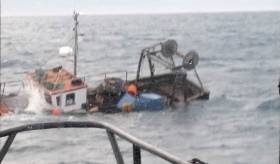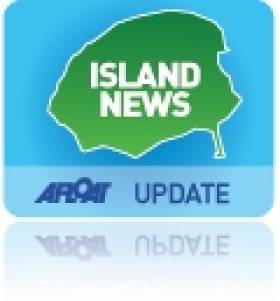Displaying items by tag: Beara
Beara Mackerel Fishery Recalled at Weekend Event
“Crates of fish were stacked up on the pier awaiting collection. Fishermen in yellow oilskins crowded the pier, busy with a million tasks. Boats thronged the water...”
That’s how writer and artist Marc O’Sullivan Vallig recalls Garnish pier in the Beara Peninsula in the 1970s.
An evening to commemorate the mackerel fishing of Garnish Bay in the 1970s as a unique way of life with its own characters is due to take place on Saturday (July 30) in Lehanmore, Garnish on the Beara peninsula.
Organiser say that despite the short-term nature of the economic boom, the mackerel fishery left indelible memories with the locals and those who migrated to fish there, as was documented by the BBC in a television series The West Asleep?
The Lehanmore organising committee says the series by BBC producer Colin Rose will be showing on a loop during the event. Also known as Life on Beara on YouTube, the series documents the 1970s way of life in the parish of Alllihies, west Cork, and the mackerel fishing in particular.
The Mackerel Fishing – Garnish Bay, Beara, in the 1970s takes place in Lehanmore, Garnish on Saturday, July 30th at 8pm.
Castletownbere RNLI rescued two fishermen from a sinking vessel in the early hours of this morning. The volunteer crew was requested to launch their all-weather lifeboat at 4.45am to go to the assistance of a fishing vessel which was reported sinking 11 miles south west of Dursey Island on the Beara peninsula.
The Castletownbere lifeboat under Coxswain Brian O’Driscoll and with six crew members onboard was launched minutes later at 4.55am.
Weather conditions at the time were described as good with a Force three to four wind and good visibility.
The naval vessel LE Orla and the Irish Coast Guard’s Rescue 115 helicopter were also tasked.
The lifeboat was on scene at 5.50am where the crew found two fishermen in a life raft.
Both men were taken aboard the lifeboat and were reported to be safe and well.
The lifeboat arrived back to Castletownbere at approximately 8am this morning.
Speaking following the call out, Paul Stevens, Castletownbere RNLI Volunteer Lifeboat Press Officer said: ‘Fortunately the weather conditions were favourable early this morning and we were able to quickly transfer the two fishermen into the safety of the lifeboat. Both are safe and well. They did the right thing this morning and raised the alarm when they got into difficulty.
‘This morning’s call out came as the RNLI prepared to launch its Respect the Water campaign today,
Remembering The First Cable Car In Ireland At Garnish
#cablecar – Lehanmore Community Co-Op at Garnish on the Beara Peninsula are planning a re-enactment of what they describe as "the first-ever cable car journey to an island in Ireland." writes Tom MacSweeney.
It will be held at Crow Head on Saturday, September 6 and will involve Kerry Mountain Rescue Team, Castletownbere Coast Guard and Castletownbere RNLI according to Paul O'Shea, the Co-op Chairman,
"The first cable car crossing was by a cable rigged up by a prominent farmer Tadgh Roger O'Sullivan from Scrivogue, Garnish, between the mainland and one of the islands to transport his sheep," Lynette Dewhurst, one of those organising the event, said.
"Tadhg's idea gave the impetus and led to the Dursey cable car, unique in Ireland and which is very well-known today. The re-enactment which we are planning will also be a joint training session between the rescue services. The actual setting-up of the re-enactment will be extremely interesting as ropes will be fired hundreds of feet above the Atlantic to then be moored between the mainland and an island. Members of the rescue service will then travel via the cable."
Shuttle buses will transport spectators from Lehanmore Centre to the demonstration site. As the viewing area is in close proximity to the sea, stewards will guide everybody.
"We are asking spectators to be prepared for all weathers as it is an exposed area and donation buckets will raise funds for Kerry Mountain Rescue. A series of talks will be held at Lehanmore Community Centre hosted by the rescue services, where there will be food and refreshments available throughout the day and the evening, with live music from 7pm till late."































































